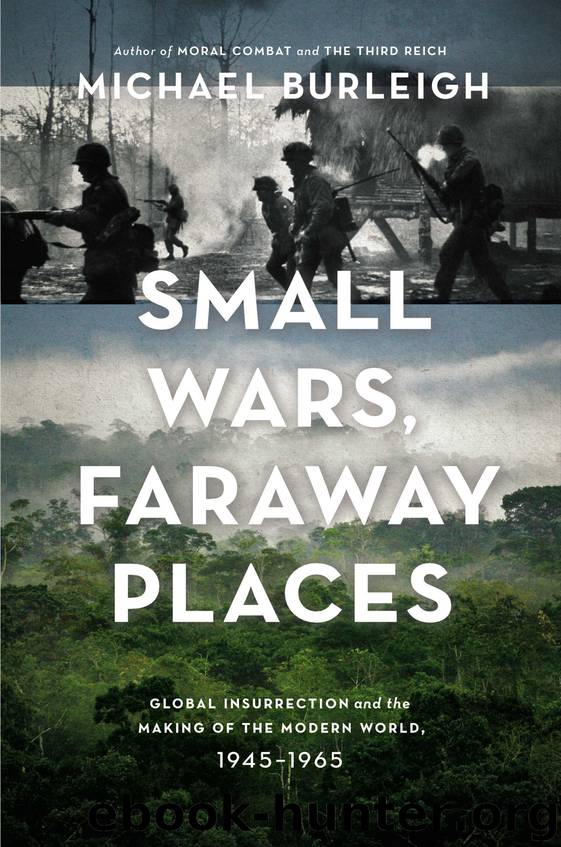Small Wars, Faraway Places by Michael Burleigh

Author:Michael Burleigh
Language: eng
Format: epub
Publisher: Penguin Group US
Published: 2013-08-10T04:00:00+00:00
Revealed Realities
On 14 October Eden met with Albert Gazier, the acting French Foreign Minister, and General Maurice Challe, Chief of the French General Staff. Challe outlined a bold plan: Israel would strike into Sinai, with a feint towards the Suez Canal, the latter operation solely designed to win Anglo–French approval for its attack by giving London and Paris a pretext to issue an ultimatum demanding that an Anglo–French force insert itself into the Canal Zone to restore ‘peace’. Having sought a peaceful outcome for three months, Eden’s sensitivity to the fact that he was not his august predecessor led him to succumb to pressure to use force. This came from the French, the Suez Group and much of the Tory press. A particularly questionable role was played by Sir Ivone Kirkpatrick, Permanent Under Secretary at the Foreign Office, whose hawkish views on Nasser were influenced by postings to Rome and Berlin in the 1930s. He went against the consensus view of his department and ensured that warnings from missions all over the world went unaired in cabinet.47
The cautiously deliberative processes of British cabinet government were abandoned. Eden and Selwyn Lloyd flew to Paris for more detailed discussions about the Franco–Israeli conspiracy to incite an Israeli attack on Egypt. These decisions were imparted to a narrow group of half a dozen key ministers and civil servants in Whitehall, who alone had access to all the facts and who then smoothed their passage through the full cabinet by being less than forthcoming about what was afoot. At a cabinet meeting on 18 October the Anglo–French–Israeli plot encountered no resistance, although the Leader of the House of Commons Rab Butler, who had the informal role of deputy prime minister, recommended pursuing the same course through an open alliance with Israel, while the Defence Secretary Viscount Monckton tried to dodge responsibility by requesting a lateral move to paymaster-general. Eden and his associates might, just, have got away with misleading their cabinet colleagues if they could have limited their role in the Israeli provocation.48
But on 21 October a message arrived from Paris; the Israelis would not make their move against Suez without more explicit British involvement. Both they and the French suspected perfide Albion would leave them hanging out to dry and demanded that the RAF should make the first move from its bases in Cyprus to take out the Egyptian Ilyushins. Selwyn Lloyd was despatched for a secret meeting with the Israelis and French, the two peoples he most mistrusted, at a villa in Sèvres. Joking that he should have worn a false moustache, Lloyd did not conceal his distaste from Israeli Prime Minister David Ben-Gurion as they haggled over the timing of pre-emptive air strikes, which Ben-Gurion insisted must take place first. Lloyd’s instructions were to maintain the fiction that Anglo–French intervention was not the result of a conspiracy, but Ben-Gurion insisted he sign a protocol outlining the secret plan agreed at Sèvres. Lloyd did so provisionally, with the reservation of referring the matter back to his superiors in London.
Download
This site does not store any files on its server. We only index and link to content provided by other sites. Please contact the content providers to delete copyright contents if any and email us, we'll remove relevant links or contents immediately.
| Africa | Americas |
| Arctic & Antarctica | Asia |
| Australia & Oceania | Europe |
| Middle East | Russia |
| United States | World |
| Ancient Civilizations | Military |
| Historical Study & Educational Resources |
The Radium Girls by Kate Moore(10976)
The Templars by Dan Jones(4227)
100 Deadly Skills by Clint Emerson(4145)
Rise and Kill First by Ronen Bergman(4074)
The Doomsday Machine by Daniel Ellsberg(3782)
The Rape of Nanking by Iris Chang(3577)
Killing England by Bill O'Reilly(3497)
Hitler in Los Angeles by Steven J. Ross(3483)
Stalin by Stephen Kotkin(3127)
12 Strong by Doug Stanton(3087)
Hitler's Monsters by Eric Kurlander(2774)
Darkest Hour by Anthony McCarten(2684)
Blood and Sand by Alex Von Tunzelmann(2641)
The Art of War Visualized by Jessica Hagy(2456)
Hitler's Flying Saucers: A Guide to German Flying Discs of the Second World War by Stevens Henry(2333)
The Code Book by Simon Singh(2263)
The Second World Wars by Victor Davis Hanson(2155)
Babylon's Ark by Lawrence Anthony(2102)
Tobruk by Peter Fitzsimons(2088)
